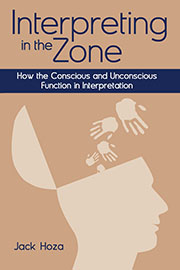How the Conscious and Unconscious Function in Interpretation
Jack Hoza
Now in Paperback
June 2016
| Table of contents Excerpt Review |
$45.00 (s) paperback, ebook |
“Hoza’s writing style and use of narratives are a delight to read. His groundbreaking research reframes what we thought we knew about the cognitive zones of interpreting. Interpreting in the Zone provides an in-depth understanding of how we make adaptations, consciously and unconsciously, and how to enhance our skills to best utilize our zones effectively. It will be an excellent resource for all interpreters—Deaf and hearing, stakeholders, and students in interpreter education programs.”
“Interpreting is an astonishing linguistic feat, made even more mysterious because we can’t see how the brain does it. Hoza pulls back the curtain on the mystery and examines the complex cognitive processes needed to make interpreting possible. This is an excellent book for those curious about the invisible mental world of interpreters.”
“This impressive volume contains research and topics that are quite accessible to educators, interpreters, and students alike. Hoza does an exceptional job of integrating cognitive science, psychology, and his newest research. He delves into the minds of practitioners for a deeper understanding of managing and self-monitoring the cognitive process. Interpreting in the Zone is encompassing but not overwhelming—all the pieces in this outstanding volume inspire us to improve our practice.”
“Jack Hoza offers ideas for how to manage meaning transfer successfully, whether or not we are in the zone. He also proposes strategies and tactics to help us recognize when we are in the zone and to savor the experience of being in the flow.”
Successful interpretation can feel seamless, an intuitive and efficient translation of meaning from one signed or spoken language to another. Yet the process of interpretation is actually quite complex and relies upon myriad components ranging from preparation to experience to honed judgment. Interpreting in the zone, instinctively and confidently, is an energizing, encompassing experience that results in great satisfaction and top performance—but what does it take to get there?
Jack Hoza’s newest research examines the components that enable interpreters to perform successfully, looking at literature in interpretation, cognitive science, education, psychology, and neuroscience, as well as reviewing the results of two qualitative studies he conducted. He seeks to uncover what it means to interpret in the zone by understanding exactly how the brain works in interpretation scenarios. He explores a range of dichotomies that influence interpretation outcomes, such as:
- Intuition vs. rational thought
- Left brain vs. right brain
- Explicit vs. implicit learning
- Novice vs. master
- Spoken vs. signed languages
- Emotion vs. reasoning
Cognitive processes such as perception, short-term memory, and reflexivity are strong factors in driving successful interpretation and are explored along with habits, behaviors, and learned strategies that can help or hinder interpretation skills. Hoza also considers the importance of professional development and collaboration with other practitioners in order to continually hone expertise.
Interpreting in the Zone shows that cognitive research can help us better understand the intricacies of the interpreting process and has implications for how to approach the interpreting task. This resource will be of value to both the interpreter-in-training as well as the seasoned practitioner.
Jack Hoza is a professor and director of the ASL/English Interpreting Program at the University of New Hampshire at Manchester. He is the son of deaf parents.
Paperback
ISBN 978-1-944838-79-9
288 pages. 6 x 9. 51 figures, 23 tables.
$45.00 (s)
Ebook
ISBN 978-1-56368-667-2
$45.00
